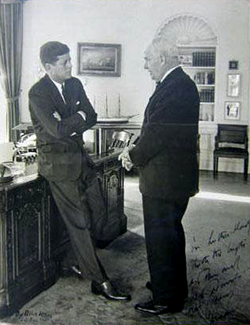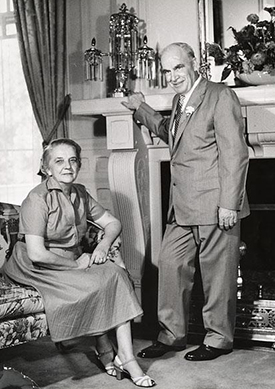Hodges, Luther Hartwell
9 Mar. 1898–6 Oct. 1974
See Also: Luther Hodges, Research Branch, NC Office of Archives and History, Martha Hodges
 Luther Hartwell Hodges, businessman, lieutenant governor, governor, secretary of commerce, and civic leader, was born at Cascade, Pittsylvania County, Va., the son of John James and Lovicia Gammon Hodges. They moved to North Carolina soon after his birth.
Luther Hartwell Hodges, businessman, lieutenant governor, governor, secretary of commerce, and civic leader, was born at Cascade, Pittsylvania County, Va., the son of John James and Lovicia Gammon Hodges. They moved to North Carolina soon after his birth.
Luther Hodges, who attained success in business, who altered the direction of a state, who influenced presidents, and who traveled the world preaching "service above self," began his life as the next to youngest of nine children of a tenant farmer. At age twelve he went to work as an office boy in a textile mill in Spray. Later he worked his way through The University of North Carolina, where he was president of the Student Council and of his senior class. Upon graduation in 1919, Hodges accepted a job as secretary to the general manager of the Marshall Field and Company mills in the Leaksville-Spray (now Eden) area. He rose rapidly in the company—as personnel manager, production manager, general manager for all Marshall Field mills, and vice-president. Throughout his business career, he was involved in various civic affairs, including the YMCA and Rotary Club, and in politics by working in the election campaigns of others.
In North Carolina during this period, Hodges served as a member of the State Board of Education and the State Highway and Public Works Commission. In 1944, while living in New York, he volunteered for service with the federal government and was made price administrator of the textile division of the Office of Price Administration. He later served briefly as a consultant to the secretary of agriculture, and as textile consultant for the U.S. Army in Germany.
After his retirement from Marshall Field in 1950, Hodges became chief of the industry division of the Economic Cooperation Administration in West Germany. In 1951 he was a consultant for the State Department on the International Management Conference, a top-level technical assistance program for European business corporations. Throughout his career to this point, Hodges had practiced a theory of his that businessmen should be involved in government.
Upon returning to North Carolina, Hodges in 1952 became a candidate for the Democratic nomination for lieutenant governor. Although virtually unknown in many areas of the state, he conducted a vigorous grassroots campaign against more established politicians and led the field in the primary. No runoff was called and Hodges was elected lieutenant governor in the fall. He was sworn in during the inauguration ceremonies of Governor William B. Umstead in January 1953.
 Hodges became governor when Umstead died in November 1954. In the six years that followed, Governor Hodges literally charted a new course for North Carolina. He utilized his experience in business to develop new approaches to the problems of the state, particularly that relating to needs for jobs. His industrialization program was the hallmark for the South. He led trade missions at home and abroad, created a system of community colleges to provide needed training and education, supported the state's first minimum wage law, and conceived the Research Triangle Park, which he called "the heart and the hope of North Carolina's industrial future."
Hodges became governor when Umstead died in November 1954. In the six years that followed, Governor Hodges literally charted a new course for North Carolina. He utilized his experience in business to develop new approaches to the problems of the state, particularly that relating to needs for jobs. His industrialization program was the hallmark for the South. He led trade missions at home and abroad, created a system of community colleges to provide needed training and education, supported the state's first minimum wage law, and conceived the Research Triangle Park, which he called "the heart and the hope of North Carolina's industrial future."
He sought to bring business management to government, creating a Department of Administration to coordinate fiscal and planning operations. In education Hodges was able to increase appropriations, initiate a grass-roots campaign to gain public support for schools, and set a moderate course for school desegregation, and he sponsored a board of higher education to coordinate the state's college and university system. He was instrumental in court improvement and in prison rehabilitation programs, including work release.
His leadership ability was recognized throughout the state, the South, and the nation. In 1956, when he ran for his own four-year term, Hodges carried every county. He served as chairman of the Southern Governors' Conference and of the Southern Regional Education Board. At the end of his term, Governor Hodges was selected by then President-elect John F. Kennedy to be his secretary of commerce.
In his four years as commerce secretary under presidents Kennedy and Lyndon B. Johnson, Hodges breathed new life into the Department of Commerce and into American business. He reorganized the department, created an Area Development Administration to help depressed areas, and was instrumental in the passage and implementation of the Trade Expansion Act. He worked for greater international trade and tourism. And he was the nation's chief spokesman for free enterprise and business ethics in the period.
After his term as secretary of commerce, Hodges returned to Chapel Hill but not to retire. He went to work for the North Carolina Research Triangle Foundation at a salary of one dollar a year paid quarterly and continued to work for the sound economic development of the state. He lectured in the School of Business Administration at the university in Chapel Hill. In 1967, he became president of Rotary International and for the next year traveled around the nation and the world for Rotary.
While governor, Luther Hodges asked that no buildings or bridges or monuments be named for him. His memory needs no such reminders. Hodges was in a sense a spirit of ethics, hard work, dedication, and success. He touched many things in his life, and all he left better than he found them. His monument is the record of service he gave to the state and to the nation.
In 1922 Hodges married Martha Blakeney of Union County, and they became the parents of two daughters, Betsy and Nancy, and a son, Luther, Jr. Mrs. Hodges died in 1969 after a fire in their Chapel Hill home. The following year Hodges married Mrs. Louise Finlayson, who survived him. He was buried in Eden.
References:
Beth G. Crabtree, North Carolina Governors, 1585–1958, Brief Sketches (1958).
Luther H. Hodges, Businessman in the Statehouse (1962).
North Carolina Manual (1953–59).
James W. Patton, ed., Messages, Addresses, and Public Papers of Luther H. Hodges, 3 vols. (1960, 1962, 1963).
Raleigh News and Observer, 7 Oct. 1974.
Gary E. Trawick and Paul B. Wyche, 100 Years, 100 Men, 1871–1971 (1971).
Who's Who in the South and Southwest (1954, 1959).
Additional Resources:
"Luther Hodges (1961–1963): Secretary of Commerce." Miller Center. University of Virginia. https://millercenter.org/president/kennedy/essays/hodges-1961-luther-sec...(accessed May 22, 2013).
Siracusa, Joseph M. Encyclopedia of the Kennedys: The People and Events That Shaped America. ABC-CLIO, 2012. http://books.google.com/books?id=PEojQDou7MIC&pg=PT562&ots=zVlZt4IwY3#v=onepage&q&f=false (accessed May 22, 2013).
Luther Hodges to Martin Luther King, Jr. June 30, 1964, Washington, D.C. The King Center. http://www.thekingcenter.org/archive/document/letter-luther-hodges-mlk-regarding-civil-rights-act-1964 (accessed May 22, 2013).
Luther Hartwell Hodges Papers, 1947-1969 (collection no. 03698). The Southern Historical Collection. Louis Round Wilson Special Collections Library. University of North Carolina at Chapel Hill. http://www.lib.unc.edu/mss/inv/h/Hodges,Luther_Hartwell.html (accessed May 22, 2013).
"Luther H. Hodges 1898-1974." N.C. Highway Historical Marker J-67, N.C. Office of Archives & History. https://www.ncdcr.gov/about/history/division-historical-resources/nc-highway-historical-marker-program/Markers.aspx?sp=Markers&k=Markers&sv=J-67 (accessed May 22, 2013).
Hodges, Luther Hartwell. The Business Conscience. Englewood Cliffs, N.J.: Prentice-Hall Inc. 1963. https://archive.org/details/ost-business-businessconscien00hodg (accessed May 22, 2013).
Image Credits:
"Photograph, Accession #: H.1961.51.1." 1961. North Carolina Museum of History.
Atkins, Ollie. "Framed Photograph, Accession #: H.2012.60.24." . North Carolina Museum of History.
"Photograph, Accession #: H.1970.78.128." 1954-1961. North Carolina Museum of History.
1 January 1988 | Dunn, Charles